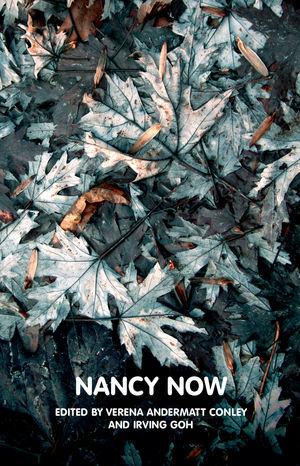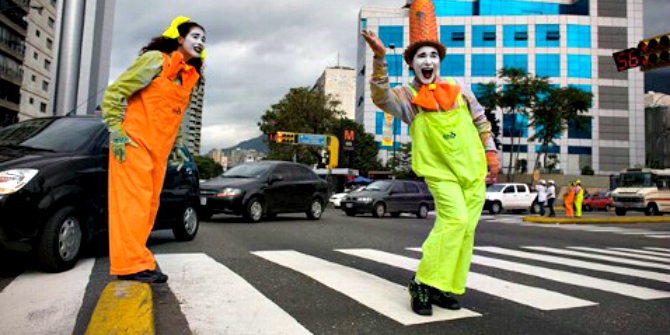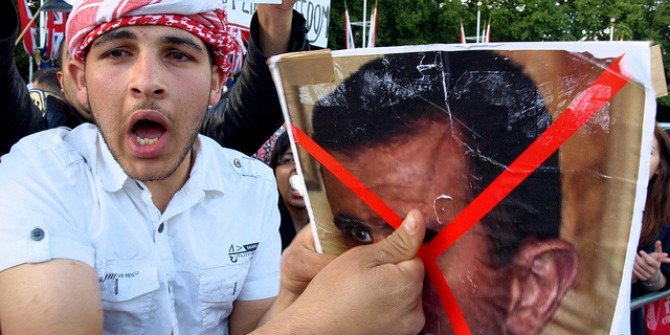Jean-Luc Nancy’s writings on philosophy, politics, aesthetics, and religion have contributed to the development of contemporary French thought and helped shape the field of continental philosophy. This volume succeeds in highlighting the ongoing relevance, indeed urgency, of Nancy’s philosophical project ‘now’, writes Jodie Matthews.
 Nancy Now. Verena Andermatt Conley and Irving Goh. Polity. 2014.
Nancy Now. Verena Andermatt Conley and Irving Goh. Polity. 2014.
‘Now’, this time in which we live, with its terrors, massacres, and injustices, is a time to ask serious questions about ‘community’, about relations with others, and how we think about ourselves and our world. ‘Now’ is the time that philosophical tools to approach these questions are needed. Nancy Now, a collection devoted to the work of French thinker Jean-Luc Nancy is bitingly timely, especially as Europe immediately responds to the Paris shootings directed at satirical magazine Charlie Hebdo, the police, and a kosher supermarket. It is for readers to deploy such tools if they are so minded: the remit of this book is to put the theory on display.
The collection of short essays is part of Polity’s Theory Now series, which has previously focused on, amongst others, Paul Virilio, Jean Baudrillard, and Michel Foucault. Bracketed by a prelude authored by the philosopher Giorgio Agamben and a piece by Nancy himself, contributors take up the mantel of considering, in a book attuned to the ‘now’, the concept of time in the work of a thinker apparently dedicated to questions of space. A priority of these essays is to explore, in largely abstract terms, the twenty-first-century Nancy and the web of Continental philosophy in which he is caught, with particular emphasis on his influences (for example, Georges Bataille and Maurice Blanchot) and the dialogue between Nancy and Jacques Derrida’s deconstructions.
Gregg Lambert’s contribution, ‘Literary Communism’, addresses Nancy’s demythologizing of ‘community’ and is perhaps the chapter most relevant to a philosophical negotiation of events in Paris in early 2015. The chapter looks back, as Nancy has done, to the emergence of this theme in Nancy’s writing of the 1980s, for the purpose of highlighting a return to ‘community’ at particular historical moments. One of the key questions associated with community for Nancy is how to express an idea or sense of community that is truthful and just, avoiding terms such as the ‘sacred’, which are in danger of evoking fascist conceptions of community, and the pitfalls of neo-liberalism. These truthful and just conceptions of community are insufficient for any organisation of a mass or multitude of people: ‘in other words, there can be no “politics of community”’; politics and community are decoupled. This is one in the eye for our contemporary politicians with their endless appeals to this or that ‘community’, and apparently ‘good news with regard to the threat of a return of totalitarianism’, but empties the intimacy out of politics, leaving us with one ‘based purely on calculation and strategy’ (pp. 51-2). Clearly, Lambert does not delineate what, when, and where community is – to do so risks the abuse of ‘community’ Nancy explicitly writes against – but marks out the terms by which Nancy frames those problematics, and comments on a philosophically conceived writing or literature (rather than the ‘literature’ of common usage) as the means for communicating community.
Georges Van Den Abbeele’s complex and engaging chapter, ‘Monograms: Then and “Now”’ examines two sets of periodic essays from Nancy, considering the relationship between form and ways of thinking, and the ‘chronic anachronicity’ of writing (p. 66). Abbeele quotes an extract from a 1993 piece, in which Nancy laments a six-month delay between the writing and publication of a column on Bosnia. Abbeele notes that such anxiety ‘would seem even more acute’ in the Twitter age in which ‘a statement more than a few hours old may appear already hopelessly outdated’. What Nancy pointed to, however, was not the delay itself, but the fact that, even after it, his comments retained a ‘sinister freshness’. The bitter repetitions of history that mean a current situation ‘has nothing current about it’ (Nancy, quoted on p. 67) damn the idea of historical progress and complicate what we might think of as ‘now’ and how to represent it.
The collection concludes with the poetic posthumanism of Nancy’s own ‘Dialogue Beneath the Ribs’, a composition that reflects on the author’s heart transplant twenty years previously. Transplantee and Transplant converse, Transplantee comparing his old heart with the new and Transplant bemoaning the ‘frenzied rhythm’ imposed upon it (p. 172). ‘Sometimes on the coronary angiographic screen’, says Transplantee, at once frightened and loving, ‘I see your tousled face’. Transplant reminds Transplantee that without immune-depressors, Transplantee’s body would reject the heart. Transplantee replies, ‘Yes, but it knows nothing. That poor thing – it believes it is a self-sufficient machine’ (p. 173). This short piece, less than four pages long, demands a consideration of sovereignty, surveillance and control, boundaries of inside and outside, and the limits of life.
The collection does not step beyond Continental theoretical perspectives to locate Nancy, and neither does it perform sustained applications of Nancy’s thought to political, social, or cultural examples. The ‘frenzied rhythm’ imposed on Nancy’s transplanted heart is inadvertently echoed in the pace with which chapter succeeds chapter – they are short and quite disparate in approach. A book of this length can only hint at the breadth of Nancy’s areas of reflection, but it succeeds in highlighting the ongoing relevance, indeed urgency, of Nancy’s philosophical project ‘now’ – however much Nancy and his fellow authors would wish to problematize that very idea.
Jodie Matthews is Research Fellow at the University of Huddersfield. Her work explores the historical representation of British Romanies and Travellers. She is interested in psychoanalysis as a philosophical/textual methodology, having studied at Cardiff University’s Centre for Critical and Cultural Theory. Read more reviews by Jodie.






